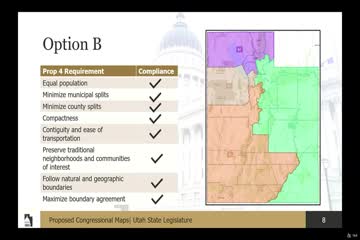Representative Owens Raises Concerns on Prop 4 Criteria During Map Discussion
September 24, 2025 | 2025 Utah Legislature, Utah Legislature, Utah Legislative Branch, Utah
This article was created by AI summarizing key points discussed. AI makes mistakes, so for full details and context, please refer to the video of the full meeting. Please report any errors so we can fix them. Report an error »

In a recent meeting of the Legislative Redistricting Committee, the atmosphere was charged with the weight of responsibility as members gathered to discuss the intricacies of redistricting in Utah. The committee, tasked with drawing new electoral maps, is navigating the delicate balance of representation and fairness, particularly in light of Proposition 4, which mandates an assessment of potential partisan bias in the mapping process.
Representative Owens raised a pivotal question regarding the implications of Proposition 4, specifically its requirement to evaluate whether any political party might be unfairly disadvantaged by the proposed maps. This inquiry highlights the committee's commitment to transparency and equity as they sift through various criteria to ensure that the redistricting process does not inadvertently punish any group.
As the discussion unfolded, members acknowledged the importance of this evaluation, recognizing that the stakes are high. The maps drawn during this process will shape the political landscape of Utah for the next decade, influencing not just elections but also the voices and concerns of constituents across the state.
The committee's deliberations are not merely procedural; they are a reflection of the democratic principles that underpin the electoral system. With each map considered, the committee members are reminded of their duty to uphold fairness and representation, ensuring that every voice is heard and valued in the political arena.
As the meeting progressed, the focus on Proposition 4 served as a reminder of the complexities involved in redistricting. The committee's commitment to addressing these challenges head-on will be crucial as they move forward, shaping the future of Utah's electoral landscape. The outcome of these discussions will resonate far beyond the walls of the meeting room, impacting the lives of Utahns for years to come.
Representative Owens raised a pivotal question regarding the implications of Proposition 4, specifically its requirement to evaluate whether any political party might be unfairly disadvantaged by the proposed maps. This inquiry highlights the committee's commitment to transparency and equity as they sift through various criteria to ensure that the redistricting process does not inadvertently punish any group.
As the discussion unfolded, members acknowledged the importance of this evaluation, recognizing that the stakes are high. The maps drawn during this process will shape the political landscape of Utah for the next decade, influencing not just elections but also the voices and concerns of constituents across the state.
The committee's deliberations are not merely procedural; they are a reflection of the democratic principles that underpin the electoral system. With each map considered, the committee members are reminded of their duty to uphold fairness and representation, ensuring that every voice is heard and valued in the political arena.
As the meeting progressed, the focus on Proposition 4 served as a reminder of the complexities involved in redistricting. The committee's commitment to addressing these challenges head-on will be crucial as they move forward, shaping the future of Utah's electoral landscape. The outcome of these discussions will resonate far beyond the walls of the meeting room, impacting the lives of Utahns for years to come.
View full meeting
This article is based on a recent meeting—watch the full video and explore the complete transcript for deeper insights into the discussion.
View full meeting

